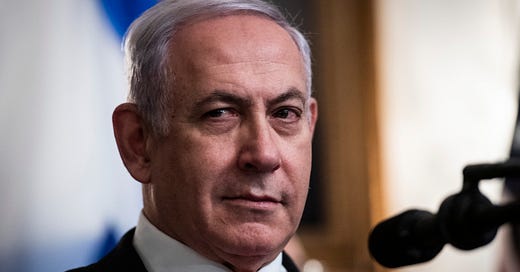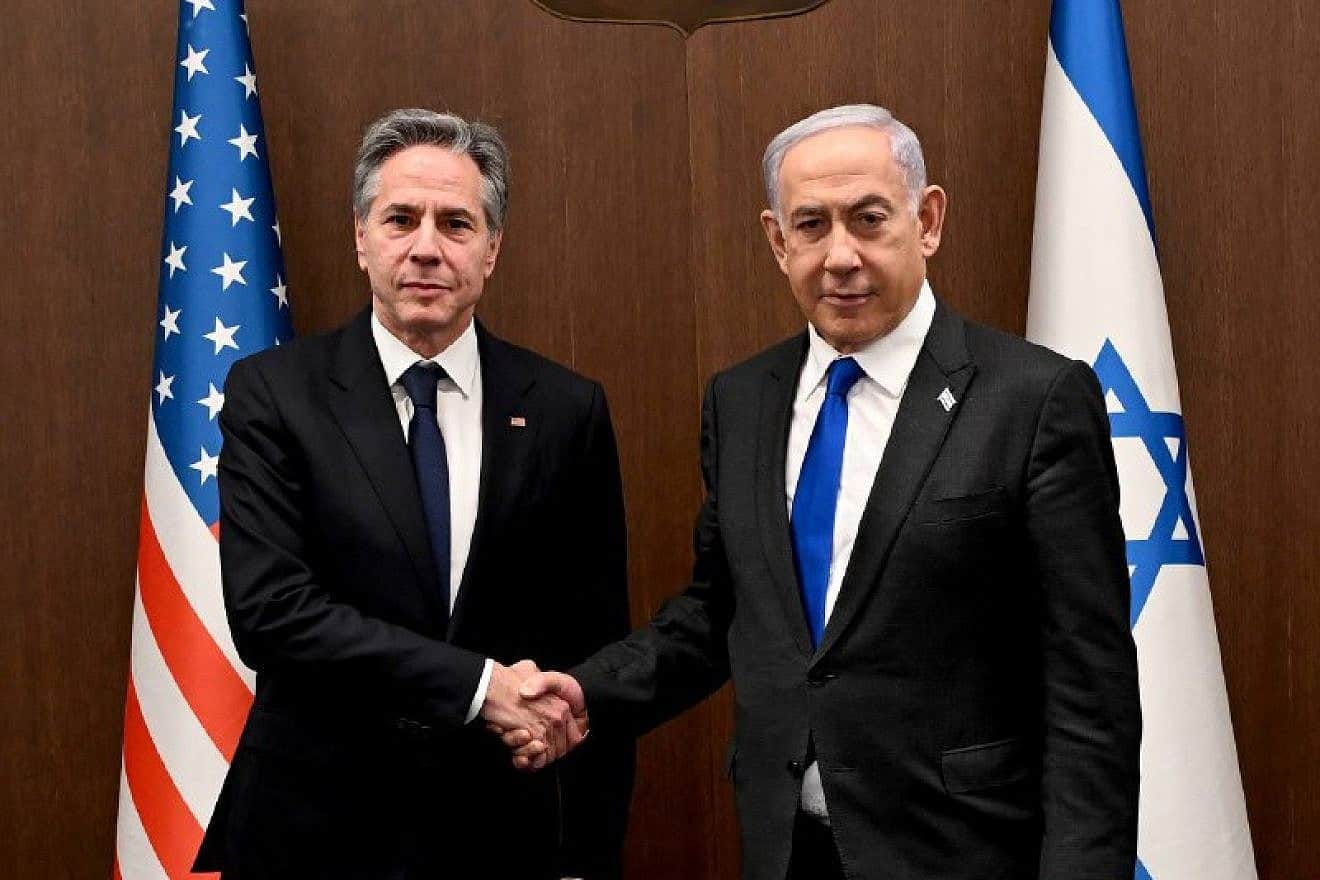“Israel accepts a ‘bridging proposal’ and we urge Hamas to do the same” remarked the lame duck Secretary of State Antony Blinken after what he described as a ‘positive’ meeting with Netanyahu. This happened on the heels of a record-setting fourth address to Congress, and meetings with Biden, Trump, and Harris that renewed momentum towards a deal. Somehow this also culminated in the ‘most constructive days’ in months of high-level mediation in Doha. Twin ‘implementation cell’ working delegations remained in Doha and Cairo to hammer out technical details of how the bridging proposal could be swiftly implemented. Blinken arrived to get things over the finish line, in the hopes of heading off the red flag of revenge hoisted in Qom.
Blinken returned to the Middle East just as the curtains opened at the Democratic National Convention in Chicago: a city, and a party haunted by the specter of 1968. With Biden and his handlers set to coronate Qween Kamala as the avatar of the Acela corridor elite. Would it not be a huge boon to her election campaign, if she could take to the stage on Thursday to announce a hostage deal, clinching a major foreign policy success, and claiming one of the Lichtmann keys to re-election? The time for it is certainly ripe. The once grand momentum of the Iran-supported ‘tentifada’ and Gaza Floyd street movement has petered out. Hell, the combined might of the Democratic Socialists of America (DSA), Russian asset Jill Stein, ivory tower Cornel West, and the local coterie of anarchists and communists only managed to assemble 15,000 people to rally to the banner of Hamas. Truly a poor showing. And their accomplishments so far? Tearing down part of the outer perimeter security fence, and unfurling a banner that nobody saw inside the United Center. The electoral dilemma facing ‘genocide Joe’ is not the same dilemma facing the Harris-Walz ticket. The Jew-hatred of the DSA is so intense that they dis-endorsed Alexandria Occasio Cortez after she acknowledged antisemitism as a problem on the left. She was given a speaking slot on the first night of the convention, where she made a mad dash to the political middle-ground. She lauded Kamala’s ‘tireless work to bring about a ceasefire and bring the hostages home!”.
And, as others have noted already, the Breadtube circus, everyone from Hasan Piker to Cenk Uygur (who once vowed to go to war with the DNC) to Vaush have - alleged genocide notwithstanding - now circled their wagons and come home to the Democrat party. The fear of the Mango Mussolini with the red hat is great indeed. Walz, the winner of the veepstakes, has put Minnesota out of play, and the Democrats burned some political capital to smooth things over with Arab-American leaders in Michigan. The other speaking slots of the first night of the DNC reflect where the party thinks the election will be decided: Georgia, and Pennsylvania. The party handed the loser of the veepstakes, Governor Josh Shapiro a prime speaking slot to dismiss allegations of antisemitism and re-assure Jewish voters, where he will join Senator John Fetterman as a powerful campaign surrogate in the Keystone State. The Democrats also have Georgia on their mind, which is why Senator Raphael Warnock snuck in a preachy ad-lib about ‘praying for Israeli and Palestinian children’. Without much fanfare, the Democratic Party platform endorsed ‘ironclad backing’ of Israeli security.
In a contest of wills between Biden and Netanyahu, the latter has clearly emerged victorious, though not for a lack of effort on the part of Biden. Gantz and Eiskenkot emerged as the choice surrogates to represent and execute Biden’s positions and desires during the war. Working together with their American counterparts in Schumer, Friedman and Ravid there was certainly a robust attempt to pressure Bibi when Gantz and Eisenkot chose to leave the war cabinet. All in all though, it proved to be a futile exercise. Nothing truly materialized from the discord. Now, in an act of total political humiliation, Gantz has to pay back the costs of his unsanctioned US trips that failed to result in any concessions from Bibi. Ehud Barak, architect of several attempts to oust Netanyahu through street protests, now joins his target in facing corruption allegations. The remaining darling alternatives to Bibi have now dwindled. We’re left with Yair Golan and “the Democrats”, who represent a minority of the Israeli electorate, and secular-nationalists like Avigdor Lieberman, Gideon Sa’ar, and arch-pragmatist Naftali Bennett. Unlikely candidates the US could toy with.
The position of the Biden administration continues to be expressed through Yoav Galant, and other elements of the security apparatus. Anonymous leaks from hostage negotiators, statements from Herzi Halevi, and President Herzog also seem to align them with Biden. Galant and Halevi seem willing to tow the American line that the IDF can leave the Philadelphia corridor without compromising secuirty. Hostage negotiators claiming that Bibi was intentionally trying to sabotage hostage deals were completely rebuffed by former Mossad chief Yossi Cohen. It’s important to point out that these disagreements are not political. They are firmly about calculations regarding core national security interests of the State of Israel. Bibi has navigated that threat by playing a shell game with the world. The eyes of the world may be on Rafah, but the eyes of his coalition partners are in Judea and Samaria, where much progress has been made.
The viable opposition to Netanyahu is not actually coming from the left, or the center, but rather from below, and from the right. His primary challenge is to manage the conflicting expectations and goals of the coalition that got him elected: Haredim, Ben Gvir, and Smotrich. The Haredi parties, would prefer to be unhappy and in government, than principled and in opposition. All they truly desire is their subsidized welfare. However the religious zionist contingent has been far busier.
Within the Defense Ministry, Smotrich has initiated a process to gradually transfer decision making authority from COGAT to civil administrators. As Finance Minister, he has leveraged the tax revenue Israel collects on behalf of the Palestinian Authority to press for political reforms, and he has done so with tacit American support. Ben Gvir, for all of his antics and barking, has worked judiciously to cut red tape for firearm ownership, with a specific focus on communities of the Gaza envelope and in Judea and Samaria, a respectable feat. The disengagement from Northern Samaria has been reversed, outposts have been retroactively legalized, and Israel approved a new planned settlement for the first time since 2017. Turns out that keeping all eyes on Rafah had a great silver lining to it.
The state of political play has converged with the situation on the ground. By holding the Netzarim Corridor, the IDF is able to conduct pinpoint raids to prevent the reconstitution of Hamas as a military force, and attempt to recover hostages, dead or alive. Crucially, these raids have also begun to dismantle capacities for homegrown manufacturing of rockets and other weapons, while the closure of the Rafah crossing, and the destruction of smuggling tunnels has prevented Hamas from being able to effectively re-arm. The humanitarian situation in Gaza remains precarious, but Israel has neutralized it as a source of pressure. Meanwhile, the security situation inside the Gaza Strip had reached a stable equilibrium. So much so, that Israel’s attentions were able to spent elsewhere.
The elimination of Haniyeh in Tehran shifted the center of political gravity from Doha back to the Gaza Strip. A move which has neutralized the importance of Qatar in the negotiation process. Sinwar is in charge, he is supposedly calling the shots now. The only bargaining chips available to Sinwar are the hostages. Every day that passes, the IDF accrues more intelligence, kills more gunmen, destroys more tunnels, and as happened recently, recovered the bodies of six hostages, thereby reducing Sinwar’s leverage. Sinwar is in a bind. And the mediator states, through a combination of diplomatic outreach, and US Navy posturing succeeded in delaying the retaliation of the so-called “axis of resistance”. The Americans have telegraphed that this ‘may be the last chance for the deal’ and their desire to avoid ‘escalation’, and the need to ‘de-escalate’ the situation in the region. There is curiously no such parallel rhetoric regarding the Ukrainian liberation of the Kursk Peoples’ Republic. This is because the concern is hollow. The goal of ‘preventing escalation’ is simply to salvage what might be left of the doomed-to-fail architecture of the Obama-Biden-Harris Middle East policy: regional balancing by accommodating Iran.
This is how Sinwar escapes the bind: by torpedoing hostage negotiations and hoping for an enlargement of the conflict, especially between Israel and Hezbollah. Galant quipped today that ‘the center of gravity is shifting from Gaza to the North’. This quip was not aimed at Sinwar, it was aimed at Tehran, and at the Biden administration. The Ayatollah doesn’t care about the fate of Hamas and other Arab, Sunni dogs in the Gaza Strip: their shared strategic interest with the Biden administration is the preservation of Hezbollah. This is why Qatar briefed the Iranians about the bridging proposal.
What are the proposals that are being attempted to bridge? Two separate visions for what Gaza looks like going forward. On one hand, Hamas and the State Department desire Gaza to be turned into a mini-Lebanon essentially. On the other side, Israel and the Pentagon desire to turn the strip into a mini-West Bank. Two different visions with very different goals.
The Lebanonization of the Gaza Strip would entail: Hamas relinquishing governance control over the Gaza Strip, being replaced by a ‘reformed’ Palestinian Authority, or some other American-backed technocratic solution, without the dissolution of Hamas as a functioning military organization. While Israel would be granted some ‘temporary’ room to maneuver in the short term, the goal would be to gradually transition security responsibilities to an American-armed and trained, Arab-financed, Palestinian Security Service. They would begin by taking control over securing convoys of humanitarian assistance, then gradually expand their responsibilities over the Rafah Crossing, and the whole of the Gaza Strip. Hamas would survive, unburdened by obligations to govern, and re-arm to continue the struggle against the Jews, now with a Palestinian security service and Arab cash acting as a metaphysical Iron Dome. The imposition of a binding and lasting ceasefire would not eliminate the threat posed by Hezbollah, preserve Iranian strategic deterrence, and tighten the axis of resistance encirclement of the Jewish state.
The West Bankification of the Gaza Strip would entail: Israel retaining overall security control of the Gaza Strip, including a permanent presence on the Philadelphi and Netzarim Corridors, and the granting of civil responsibility to Palestinians in exchange for meaningful and permanent political reforms. These include an end to the “pay to slay” program, adopting an Emirati or Saudi educational curriculum that ceases the demonization of Jews. It would also require an acceptance of a ‘limited’ right of return as a stepping stone to terminating the operations of UNRWA inside the West Bank and Gaza Strip. Arab states could participate in the reconstruction, economic development, and political future of the Gaza Strip. As the security situation stabilizes, and a generation of Palestinians emerges free of both the fanatical Islamism of Hamas, and the fanatical Fanonism of Fatah, creative political solutions, from two-state solutions, to confederations, to building islands in the Mediterranean Sea can be considered. The removal of a Palestinian veto over Israel-Arab relations, as demonstrated by the Abraham Accords, would permit the development of a pan-Middle Eastern security architecture to contain, and ultimately eliminate the Iranian nuclear threat.
The path to both outcomes runs through the framework of a ceasefire-for-hostages deal. If Blinken’s statements are any indication, then it appears the Americans are now paying lip service to West Bankification, at least until after the 2024 Presidential Election.
Bibi, being the expert political agent he is, seems to have managed to gain the upper hand over an intense American pressure campaign while re-centering Israeli desires over Qatari and Iranian goals. You can loathe or love Bibi, and its usually a mix of both for many, but a basic level of respect is deserved for his statecraft.
I have no idea what a second term Trump will do with the situation in the Middle East he will inherit if he is elected. He may continue down the road of the Abraham Accords. If Harris wins, the foreign policy advisors she has surrounded herself with suggests that a Harris administration will pursue the Lebanonization of the Gaza Strip by any and all means.
Israel must prepare for both scenarios.
- Abba Eben








I enjoy your writing a lot, and appreciate your political-cultural analyses. Keep them coming!
God save us from this woman in the White House. Honestly.